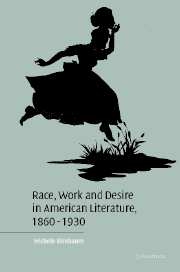Book contents
- Frontmatter
- Contents
- List of illustrations
- Acknowledgments
- Introduction: working relations and racial desire
- 1 Dressing down the First Lady: Elizabeth Keckley's Behind The Scenes, Or Thirty Years A Slave And Four Years In The White House
- 2 Off-color patients in Frances E. W. Harper's Iola Leroy and W. D. Howells's An Imperative Duty
- 3 “Alien hands” in Kate Chopin's The Awakening
- 4 “For blood that is not yours”: Langston Hughes and the art of patronage
- Epilogue: “co-workers in the kingdom of culture”
- Notes
- Index
2 - Off-color patients in Frances E. W. Harper's Iola Leroy and W. D. Howells's An Imperative Duty
Published online by Cambridge University Press: 07 December 2009
- Frontmatter
- Contents
- List of illustrations
- Acknowledgments
- Introduction: working relations and racial desire
- 1 Dressing down the First Lady: Elizabeth Keckley's Behind The Scenes, Or Thirty Years A Slave And Four Years In The White House
- 2 Off-color patients in Frances E. W. Harper's Iola Leroy and W. D. Howells's An Imperative Duty
- 3 “Alien hands” in Kate Chopin's The Awakening
- 4 “For blood that is not yours”: Langston Hughes and the art of patronage
- Epilogue: “co-workers in the kingdom of culture”
- Notes
- Index
Summary
Both Keckley's exposé and King's romance capitalize on the ability of domestic service to provide a model that both insists upon and regulates interracial contact, particularly between women. By the 1890s the medical industry, newly organized at the national level, offered another, and to some extent historically overlapping, rubric that promised to orchestrate cross- as well as same-sex race relations. Just as white employers and black domestics enlisted historically situated workplace codes and vernaculars, the doctor-patient relationship was replete with its own peculiar host of rhetorical protocols and rituals. And they, too, had political ends and effects: semiformalized by the turn of the century, medical discourses created a clinical color-line that, if it could not be crossed, could be treated. And when the physicians were white and the patients of– or “off” – color, the discourses of health care and Jim Crow united to most curious effect.
The influential physician (and novelist) S. Weir Mitchell quipped in 1881 that “To be ill is a feminine verb,” phrasing lightly his quite serious judgment that womanhood itself is a pathological condition. Indeed, according to both popular and scientific assessment in fin de siècle America, the hysteric typified modern womanhood; she was, as Carroll Smith-Rosenberg points out, “characteristically female … the embodiment of a perverse or hyper-femininity.” Though hysteria has been the subject of much feminist interrogation, it is a defining model of womanhood whose racial politics have yet to be explored.
- Type
- Chapter
- Information
- Race, Work, and Desire in American Literature, 1860–1930 , pp. 58 - 75Publisher: Cambridge University PressPrint publication year: 2003



